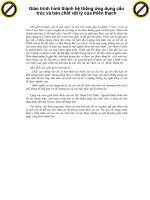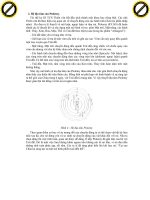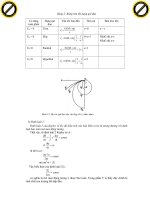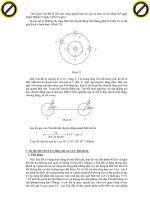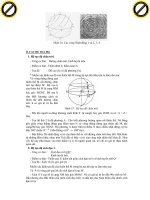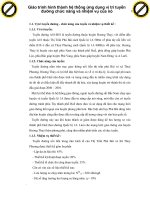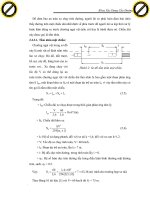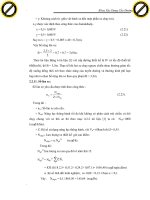FILE VÀ HỆ THỐNG ỨNG DỤNG NGÔN NGỮ C
Bạn đang xem bản rút gọn của tài liệu. Xem và tải ngay bản đầy đủ của tài liệu tại đây (117.76 KB, 7 trang )
FILE VÀ HỆ THỐNG ỨNG DỤNG NGÔN NGỮ C
1. Xóa 1 file dùng Remove
#include <stdio.h>
int main()
{
remove("d:/urls1.dat");
return 0;
}
2. Xóa 1 File dùng Unlink
#include <stdio.h>
int main()
{
remove("C:/pete.txt");
return 0;
}
3. Cho biết thông tin FAT#include <stdio.h>
#include <dos.h>
void main(void)
{
struct fatinfo fat;
getfatd(&fat);
printf("Sectors per cluster %d\n", fat.fi_sclus);
printf("Clusters per disk %u\n", fat.fi_nclus);
printf("Bytes per cluster %d\n", fat.fi_bysec);
printf("Disk type %x\n", fat.fi_fatid & 0xFF);
}
4. Đếm tần suất 1 kí tự trong 1 file
# include <stdio.h>
# include <string.h>
main()
{
FILE *fp;
char in[100];
long int freq[257];
int i;
printf("\nFile frequency table generator\n\n");
printf("\nInput file:");
scanf("%s",in);
fp=fopen(in,"rb");
if(fp==NULL)
{
printf("\nCould not open input file.Aborting\n");
return 1;
}
for(i=0;i<257;i++)
freq[i]=0;
while(i=fgetc(fp),i!=EOF)
{
freq[i]++;
}
fcloseall();
fp=fopen("count.txt","w");
fprintf(fp,"\nCharacter frequency table of %s\n",in);
fprintf(fp,"\nCharacter ASCII frequency\n\n");
for(i=0;i<256;i++)
{
if(i==26)
{
fprintf(fp,"\t 26\t %ld\n",freq[26]);
}
else if(i==9)
{
fprintf(fp,"\t 9\t %ld",freq[9]);
}
else if(i<10)
{
fprintf(fp,"%c\t %d\t %ld\n",i,i,freq[i]);
}
else if(i<100)
{
fprintf(fp,"%c\t %d\t %ld\n",i,i,freq[i]);
}
else
{
fprintf(fp,"%c\t %d\t %ld\n",i,i,freq[i]);
}
}
fcloseall();
printf("\nFrequency table copied to count.txt\n");
}
5. Đọc nội dung 1 file
#include <stdio.h>
void main(void)
{
FILE *fp;
char ch;
fp = fopen("websites.txt","r");
ch = getc(fp);
while(ch!=EOF)
{
putchar(ch);
ch = getc(fp);
}
printf("\n\n");
}
6. Chọn ổ đĩa trong DOS#include <stdio.h>
#include <dir.h>
void main(void)
{
int drives;
drives = setdisk(3);
printf("The number of available drives is %d\n",
drives);
}
7.Chọn ổ đĩa trong WINS
#include <windows.h>
#include <stdio.h>
#include <stdlib.h>
void main(void)
{
char szBuffer[MAX_PATH+100];
UINT nDrive, AvailDrive = 0;
int dwLogicalDrives = GetLogicalDrives();
DWORD Success;
printf("Number of logical drives: %d\n",
dwLogicalDrives);
for (nDrive = 0; nDrive < 32; nDrive++)
{
if (dwLogicalDrives & (1 << nDrive))
{ // Is drive available?
AvailDrive++;
// Get disk information.
wsprintf(szBuffer, "%c:\\", nDrive+'A',
'\0');
// Print out information.
if(SetCurrentDirectory(szBuffer))
printf("%s Is Now Current\n", szBuffer);
else
printf("Could not set %s as the current
drive\n", szBuffer);
}
}
printf("Number of drives available: %d\n",
AvailDrive);
}
8. Cho biết kích thước 1 file
#include <stdio.h>
#include <io.h>
#include <fcntl.h>
#include <sys\stat.h>
int main()
{
int fp;
long file_size;
if ((fp = open("f:/cprojects/urls.txt", O_RDONLY)) ==
-1)
printf("Error opening the file \n");
else
{
file_size = filelength(file_handle);
printf("The file size in bytes is %ld\n", file_size);
close(fp);
}
return 0;
}


